Pavlo_K/iStock/GettyImages
The Best (and Only) Method You Need to Cook a Prime Rb
You can ruin a rib-eye roast several ways. You can burn it, slice it crooked using a serrated knife, experiment on it with some untested spice rub or marinade ... heck, you could even drop it in the kitty litter box on the way to the table (it's happened before). But the most common cause of prime rib ruination is uneven cooking, which usually results in a nice crust but a dry, largely overcooked interior. Reverse-searing correctly prevents this.
Why Reverse-Searing Works
Reverse-searing seems to go against conventional wisdom, which says to give meat a hard, high-temperature sear at the start of cooking, like you do with steaks and other meats. That's not to say you can't cook a good prime rib by searing it first, but proper reverse-searing makes cooking the idyllic prime rib – one with a moist, juicy medium-rare interior that transitions sharply to a rich, caramelized and deliciously crusty exterior – so easy you could almost consider it foolproof.
All roasted foods cook from the outside in, but this fundamental cooking fact takes on added significance with large cuts like prime rib. When you sear prime rib in a screaming hot oven at, say, around 500F or higher, then drop the temperature to around 300F for extended cooking, you can get a nice crust and a textbook medium-rare center – but only the very center, because most of the ends and sides cook to medium or medium well. This occurs for two reasons. First, for the exterior of a rib-eye roast to caramelize into a delicious crust, it must initially dry for several minutes (during the start of searing). And while that delectable crust forms, the moisture below the surface of the roast moves outward, causing the interior to start drying out before it even gets to the post-sear cooking phase. Second, it takes about 30 minutes for oven temperature to drop from 500F to 300F, during which time the "outer interior" of the roast continues cooking at a higher-than-ideal temperature.
This makes reverse-searing the ultimate method for cooking the previously described idyllic prime rib: Cook the roast at a very low temperature until it reaches 125F throughout, and then sear it at 500F, after resting it for 20 to 30 minutes outside the oven.
Cooking the Perfect Prime Rib
Start with a high-quality USDA Choice or USDA Prime bone-in rib-eye roast; you need superior fat marbling for moistness. And although bones don't contribute to flavor, they do regulate temperature, which helps the roast cook evenly. Note that the "prime" in "prime rib" doesn't refer to its USDA grade, but rather the anatomical region of the cow it comes from, the rib sub-primal.
Season the rib-eye roast at least 24 hours before cooking it.
Seasoning it liberally with kosher salt (and freshly ground black pepper) 24 hours to four days prior to cooking allows the salt more time to penetrate and season the interior. After salting the roast, let it rest on a rack, uncovered, in the refrigerator.
Heat the oven to its lowest temperature.
Some ovens don't go below 200F to 250F; if your oven doesn't, use the Warm setting. Set the roast fat-side up on a wire rack set inside a rimmed roasting pan, and place it in the oven.
Cook the prime rib until it reaches 125F, about 5 1/2 hours.
Check the temperature at various places in the roast at the center and sides; they should average between 125F and 130F after 5 1/2 to 6 hours of cooking.
Rest the roast for 20 to 30 minutes.
Take the roast out of the oven and let it rest in the pan, covered loosely with aluminum foil, at room temperature. Increase the oven temperature to its highest setting (500F to 550F), and then return the roast to the oven.
Sear the roast for 8 to 10 minutes just before serving.
Eight to 10 minutes is usually enough time for a crisp, caramelized crust to form. Strain the juices from the roasting pan and, if needed, bolster them with beef stock, and serve them with the roast.
Related Articles

Can I Cook a Roast Beef for Three Hours ...

How to Cook a Beef Roast in a Roaster ...
How to Cook a Spencer Roast

How to Make a Blackbuck Antelope Roast
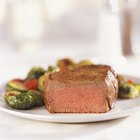
How to Cook Steak on a Baking Sheet
The Best Way to Cook Four Pounds of ...
How Do I Cook a Boneless Rump Roast for ...
How to Use Vinegar to Cook Pot Roast
How to Cook a Choice Sirloin Tip Roast
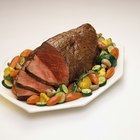
How to Cook a Roast Beef to a Perfect ...
The Best Way to Cook Moist Tri Tip

Does Cooking at a Low Temperature for a ...

How to Cook Deer Sirloin
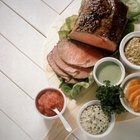
How to Cook 5 Lbs. of Beef Tenderloin
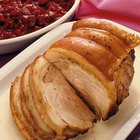
Does Cooking a Pork Roast Frozen Help ...
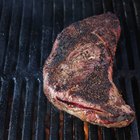
The Best Ways to Cook a Buffalo Tri-Tip ...

How to Grill a Lamb Steak
What is the Best Meat for Pot Roast?

How to Slow Cook a Rolled Rib of Beef
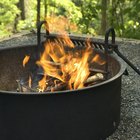
How to Cook a Beef Roast Over an Open ...
References
Warnings
- Don't handle or transfer the rib-eye roast with a large fork or other kitchen tool that pierces the meat. The beef's juices escape through puncture marks, robbing the finished product of tenderness and flavor.
Writer Bio
A.J. Andrews' work has appeared in Food and Wine, Fricote and "BBC Good Food." He lives in Europe where he bakes with wild yeast, milks goats for cheese and prepares for the Court of Master Sommeliers level II exam. Andrews received formal training at Le Cordon Bleu.